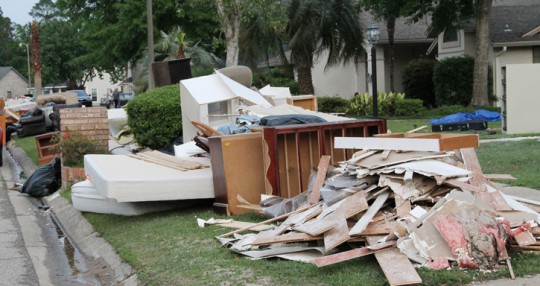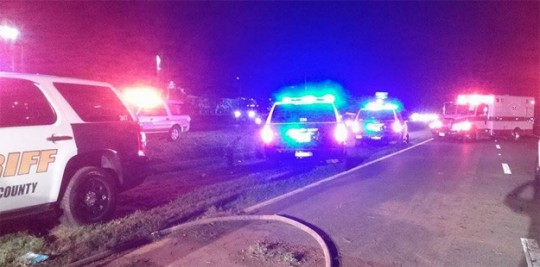Obama Approves Individual Flood Assistance For Escambia, Santa Rosa
May 7, 2014
President Barack Obama has approved federal financial assistance for residents of Escambia and Santa Rosa counties.
Assistance can include grants for temporary housing and home repairs, low-cost loans to cover uninsured property losses, and other programs to help individuals and business owners recover from the effects of the disaster.
 Escambia and Santa Rosa Counties have recieved the FEMA Disaster Declaration for Individual Assistance. The Individuals and Households Program (IHP) is a combined FEMA and State program. The IHP provides up to $32,400 (FY 2014) for financial help or direct services to those who have necessary expenses and serious needs if they are unable to meet the needs through other means.
Escambia and Santa Rosa Counties have recieved the FEMA Disaster Declaration for Individual Assistance. The Individuals and Households Program (IHP) is a combined FEMA and State program. The IHP provides up to $32,400 (FY 2014) for financial help or direct services to those who have necessary expenses and serious needs if they are unable to meet the needs through other means.
When a disaster occurs, this program provides grant money and services to people in the declared area whose property has been damaged or destroyed and whose losses are underinsured or not covered by insurance. In every case, the disaster survivor must register for assistance and establish eligibility. The toll-free telephone registration number is (800) 621-FEMA (3362). Individuals who have a speech disability or hearing loss and use TTY should call (800) 462-7585 directly; those who use 711 or Video Relay Service (VRS) should call (800) 621-3362.
Applicants may also register online at www.disasterassistance.gov or via their mobile device at m.fema.gov FEMA (or the providing agency) will verify eligibility and need before assistance is offered.
FEMA’S GUIDE TO INDIVIDUAL ASSISTANCE
Individuals and Households Program
The Individuals and Households Program (IHP) is a combined FEMA and State program. The IHP provides up to $32,400 (FY 2014) for financial help or direct services to those who have necessary expenses and serious needs if they are unable to meet the needs through other means. When a disaster occurs, this program provides grant money and services to people in the declared area whose property has been damaged or destroyed and whose losses are underinsured or not covered by insurance. In every case, the disaster survivor must register for assistance and establish eligibility. The toll-free telephone registration number is (800) 621-FEMA (3362). Individuals who have a speech disability or hearing loss and use TTY should call (800) 462-7585 directly; those who use 711 or Video Relay Service (VRS) should call (800) 621-3362.
Applicants may also register online at www.disasterassistance.gov or via their mobile device at m.fema.gov FEMA (or the providing agency) will verify eligibility and need before assistance is offered.
What Types of Assistance Are Provided?
The IHP has two provisions: Housing Assistance and Other Needs Assistance. The IHP – Housing Assistance (HA) (including Temporary Housing, Repair, Replacement and Semi-Permanent or Permanent Housing Construction) assures that people whose homes are damaged by a disaster have a safe place to live. The IHP – Other Needs Assistance (ONA) (including personal property and other items) provides financial assistance to individuals and households who have other disaster-related necessary expenses or serious needs. These programs are designed to provide funds for expenses that are underinsured or not covered by insurance. They are available only to homeowners and renters who are United States citizens, non-citizen nationals, or qualified aliens affected by the disaster. The following is a list of the types of assistance available through this program and what each provides.
Housing Assistance (HA)
Temporary Housing – homeowners and renters receive funds to rent a different place to live or a temporary housing unit when rental properties are not available.
Repair – homeowners receive grants to repair damage from the disaster that is not covered by insurance. The goal is to make the damaged home safe and sanitary.
Replacement – homeowners receive limited funds to replace their destroyed home.
Semi-Permanent or Permanent Housing Construction – This type of assistance occurs only in insular areas or remote locations specified by FEMA, where no other type of housing assistance is possible.
Other Needs Assistance (ONA)
Applicants receive grants for necessary and serious needs caused by the disaster. This includes personal property, transportation, funeral, medical, dental, moving and storage and other expenses that FEMA approves. The homeowner or renter may need to apply for a SBA loan before receiving assistance.
Small Business Administration: Disaster Loans
The U.S. Small Business Administration (SBA) can make federally subsidized loans to repair or replace homes, personal property, or businesses that sustained damages not covered by insurance. The SBA can provide three types of disaster loans to qualified homeowners, renters and businesses:
(1) home disaster loans to homeowners and renters to repair or replace disaster-related damages to home or personal property,
(2) business physical disaster loans to business owners to repair or replace disaster-damaged property, including inventory, and supplies; and
(3) economic injury disaster loans, which provide capital to small businesses and small agricultural cooperatives to assist them through the disaster recovery period.
For many individuals the SBA disaster loan program is the primary form of disaster assistance.
Disaster Unemployment Assistance
The Disaster Unemployment Assistance (DUA) program is funded by FEMA and administered, under a delegation of authority, by the U.S. Department of Labor. DUA provides unemployment benefits and re-employment services to eligible individuals who have become unemployed because of major disasters. DUA benefits are generally paid up to 26 weeks beginning with the first week following the date the major disaster began and ending with the 26th week following the date the major disaster is declared by the President., as long as the individual‘s unemployment continues to be a direct result of the major disaster. These benefits are made available to individuals not covered by other unemployment compensation programs, such as self-employed, farmers, migrant and seasonal workers and those who have insufficient quarters to qualify for other unemployment compensation.
All unemployed individuals must register with the State Workforce Agency in the declared State by phone, internet, or in person at local claims offices to determine their eligibility for the DUA program
Legal Services
Pursuant to 42 USC §5182 of the Stafford Act, whenever the President declares a major disaster, FEMA, through a Memorandum of Agreement with the Young Lawyers Division of the American Bar Association, provides free legal assistance to disaster survivors. Legal advice is limited to cases that will not produce a fee (i.e., these attorneys work without payment). A legal service hotline toll-free number may also be available as a means for individuals to contact the volunteer lawyers for assistance with legal questions and concerns. Cases that may generate a fee are turned over to the local lawyer referral service. The assistance that participating lawyers provide typically includes:
- Assistance with insurance claims (life, medical, property, etc.);
- Assistance with home repair contracts;
- Counseling on landlord/tenant problems;
- Assisting in consumer protection matters, remedies, and procedures and
- Replacement of wills and other important legal documents destroyed in a major disaster
Disaster legal services are provided to low-income individuals who, prior to or because of the disaster, are unable to secure legal services adequate to meet their needs as a consequence of a major disaster.
If the loss was sustained from a federally declared disaster, the taxpayer may choose which of those two tax years provides the better tax advantage.
The Internal Revenue Service (IRS) can expedite refunds due to taxpayers in a federally declared disaster area. An expedited refund can be a relatively quick source of cash, does not need to be repaid and does not need an Individual Assistance declaration. It is available to any taxpayer in a federally declared disaster area.
Crisis Counseling
The Crisis Counseling Assistance and Training Program (CCP) is designed to provide supplemental funding to States for short-term crisis counseling services to people affected in Presidentially declared disasters. Supplemental funding for crisis counseling is available to the State through two grant programs: the Immediate Services Program which provides funds for up to 60 days of services immediately following a disaster declaration and the Regular Services Program which provides funds for up to nine months following a disaster declaration. A State may request either or both types of funding. The following services are offered under the CCP grant program:
- Individual Crisis Counseling – Helps survivors understand their reactions, improve coping strategies, review their options and connect with other individuals and agencies that may assist them.
- Basic Supportive or Educational Contact – General support and information on resources and services available to disaster survivors.
- Group Crisis Counseling – Group sessions led by trained crisis counselors who offer skills to help survivors cope with their situations and reactions.
- Public Education – Information and education about typical reactions, helpful coping strategies and available disaster-related resources.
- Community Networking and Support – Relationship building with community resource organizations, faith-based groups and local agencies.
To be eligible for crisis counseling services funded by this program, the person must be a resident of the designated area or must have been located in the area at the time the disaster occurred. The person must also have a mental health problem which was caused by or aggravated by the disaster or its aftermath, or he or she must benefit from services provided by the program.
Disaster Case Management
The Disaster Case Management (DCM) Program is funded by FEMA and implemented in partnership with the U.S. Department of Health and Human Services Administration for Children and Families (ACF). Under this program FEMA offers a two-phased approach to assist disaster survivors with disaster caused unmet needs.
Phase I Direct Federal DCM Services – This is the rapid response element of DCM and includes the rapid deployment of a national team to the impacted area to begin immediate outreach and assessment with eligible clients impacted by the disaster. This team is on the ground within 72 hours of deployment. Team deployments may last 30 to 180 days, depending on the State’s need.
Phase II DCM Grant – This is a federal grant to States to support the delivery of long-term DCM assistance up to 24 months from the date of the declaration, or if Phase I was implemented, an additional 18 months not to exceed a total of 24 months. This grant makes funds available to the State for disaster case managers to work directly with disaster survivors to assist them with the development of a disaster recovery plan that may include referrals, monitoring of services and advocacy, when needed.
Internal Revenue Service Special Tax Considerations
Taxpayers who have sustained a casualty loss from a declared disaster may deduct that loss on the federal income tax return for the year in which the casualty actually occurred, or elect to deduct the loss on the tax return for the preceding tax year. The National Disaster Relief Act provides the following tax benefits:
- Allows all taxpayers, not just those who itemize, to claim the casualty loss deduction regardless of the taxpayer’s adjusted gross income level.
- Increases the amount by which all individual taxpayers must reduce their personal casualty losses from each casualty from $100 to $500 for taxable years beginning after Dec. 31, 2008. The reduction amount returns to $100 for taxable years beginning after Dec. 31, 2009.
- Removes the requirement that the net casualty loss deduction be allowed only if the casualty loss exceeds 10 percent of the taxpayer’s adjusted gross income.
- Provides a five-year net operating loss (NOL) carryback for qualified natural disaster losses.
- Waives certain mortgage revenue bond requirements for affected taxpayers and allows the bond proceeds to be used for rebuilding.
One Critically Injured In Highway 29 Wreck In Cantonment
May 7, 2014
One person was critically injured in a single vehicle crash Tuesday night in Cantonment.
The driver of a pickup truck pulling a trailer lost control , left the roadway and overturned on Highway 29 near West Roberts Road. The 46-year old male was trapped in his vehicle and had to be extricated by first responders. He was airlifted to a Pensacola hospital by LifeFlight as a “trauma alert”.
The accident remains under investigation by the Florida Highway Patrol. Further details, including the man’s name, have not yet been released by the FHP.
Southbound Highway 29 was closed for a brief period of time by the accident.
Pictured: One person was injured in this single vehicle accident on Highway 29 Tuesday night. NorthEscambia.com photos by Kristi Smith, click to enlarge.
Century Grant To Map Water System; Getting Paid To Maintain Red Light
May 7, 2014
The Town of Century is seeking a grant worth about $25,000 to map their water system. The grant map will show the entire system, plus all of shutoff valves and connections.
The town has also entered into an agreement with the Florida Department of Transportation under which FDOT will compensate the town for maintaining the traffic signal at Highway 29 and East Highway 4 — the only traffic signal in the town.
Two Shot Tuesday Evening In Escambia County
May 7, 2014
Two people were reportedly shot in Escambia County Tuesday evening.
 Just after 7:00 an 18-year old was shot in the leg near the 2500 block of South Catherine Avenue and North “S” Street. The victim was a “trauma alert” as he was transported to Baptist Hospital by Escambia County EMS.
Just after 7:00 an 18-year old was shot in the leg near the 2500 block of South Catherine Avenue and North “S” Street. The victim was a “trauma alert” as he was transported to Baptist Hospital by Escambia County EMS.
A few minutes later, a second shooting was reported a on West Yonge Street. The 20-year old male victim of that shooting was transported as a trauma alert to Sacred Heart Hospital. He was reportedly shot in the back, possibly with a shotgun.
Further details have not yet been released by the Escambia County Sheriff’s Office as their investigation continues.
Cantonment Church Conducting Toy Drive For Flood Victims
May 7, 2014
Pine Forest Assembly in Cantonment is conducting a toy and backpack drive for the youngest victims of the recent flooding.
Backpacks and toys small enough to fit inside of backpacks are being collected at Pine Forest Assembly of God, 3125 Pine Forest Road from 9 a.m. until 1 p.m., Monday-Friday.
“As I continued to think about the families who have lost all of their belongings, God placed the children on my heart. Sometimes we forget about the little ones and the impact that these kinds of disasters have on them,” said Pine Forest Assembly Children’s Pastor Heather Murphy. “Knowing that most families do not have a home to store items, I am asking for smaller toys that can fit inside of a backpack.”
For more information, contact Heather Murphy at (850) 476-1378.
Cantonment Man Arrested For Checks Stolen From Grandma
May 7, 2014
A Cantonment man was arrested by Pensacola Police for allegedly trying to pass numerous checks stolen from his grandmother as she was near death.
 Jason Roland Wells, 31, was charged with seven felony counts of counterfeiting of checks and three felony counts of fraud for uttering false checks. Pensacola Police were called after Roland tried to use a $25 check to pay for a drink and chewing gun, but the check was declined as were checks for $30 and $28 — all pre-written.
Jason Roland Wells, 31, was charged with seven felony counts of counterfeiting of checks and three felony counts of fraud for uttering false checks. Pensacola Police were called after Roland tried to use a $25 check to pay for a drink and chewing gun, but the check was declined as were checks for $30 and $28 — all pre-written.
Wells admitted to police, according to an arrest report, that he knew the checks were worthless and that he knew he had been removed from his grandmother’s account.
Wells remained jailed early Wednesday morning with bond set at $75,000 on the check and counterfeiting charges. However, he was being held without bond due to an outstanding probation violation case.
Northview, West Florida Out Of Baseball Playoffs; Catholic Advances
May 7, 2014
Both Northview and West Florida were knocked out of the regional semifinals in their respective classes Tuesday, while Pensacola Catholic advanced.
 The Northview Chiefs lost to Bozeman 12-2 in the Class 1A regional semifinals Tuesday at Bozeman. The Chiefs ended their winning season at 15-7.
The Northview Chiefs lost to Bozeman 12-2 in the Class 1A regional semifinals Tuesday at Bozeman. The Chiefs ended their winning season at 15-7.
In 4A action, Catholic beat the West Florida Jaguars 8-0. West Floirda finished their season at an even 17-17. Nick Lackey went 2-4 at bat for the Jaguars, while Kyle Harrison was 1-2.
Catholic moves on to the Region 1-4A championship game at 7 p.m. Friday against the Jacksonville Episcopal Eagles at Jacksonville Episcopal High School.
Judge Rules For State In Teacher Evaluation Case
May 7, 2014
Though raising questions about the fairness of the system, a federal judge Tuesday rejected a constitutional challenge to policies that stemmed from a 2011 state law tying teacher evaluations to student performance.
 U.S. District Judge Mark Walker dismissed part of the case last month but issued a broader order Tuesday backing the state and school boards that were named as defendants in the case.
U.S. District Judge Mark Walker dismissed part of the case last month but issued a broader order Tuesday backing the state and school boards that were named as defendants in the case.
The lawsuit, filed last year and spearheaded by the Florida Education Association, raised constitutional due-process and equal-protection arguments. It took issue with part of the law that has allowed some teachers to be evaluated based on the test scores of students who were not in their classrooms.
Similarly, teachers could be evaluated on student test scores in subject areas they didn’t teach. Walker wrote that the “unfairness of the evaluation system as implemented is not lost on this court.”
But he also wrote that the case is not about the fairness of the evaluation system but whether it is constitutional.
“The legal standard for invalidating legislative acts on substantive due process and equal protection grounds looks only to whether there is a conceivable rational basis to support them,” Walker wrote. “For reasons that have been explained, the state defendants could rationally conclude that the evaluation policies further the state’s legitimate interest in increasing student learning growth. The same can be said of the district defendants.”
FEA President Andy Ford issued a statement after the ruling that expressed disappointment and said the union is “evaluating what further steps we might take in this legal process.”
The school boards named as defendants in the case were from Alachua, Hernando and Escambia counties.
by The News Service of Florida
Betty Conn Johnson
May 7, 2014
Betty Conn Johnson, 80, of Atmore, passed away Wednesday, May 7, 2014 in Atmore. She was a beautician, born in Greenville, AL, on August 14, 1933, to the late Grady and Berta Lou Henderson Lunsford.
She is preceded in death by her husbands, Harold C. Conn and Dudley V. Johnson; and son, James Johnson.
Survivors are her son, Hal Johnson of Atmore; step-son, Pat Conn of Atmore; and grandson, Nick Johnson of Canoe.
Graveside services will be Friday May 9, 2014, at 11 a.m. in Oak Hill Cemetery with Rev. Mike Grindle officiating.
Interment will follow in Oak Hill Cemetery.
Johnson-Quimby Funeral Home is in charge of all arrangements.
Just For Kids: Summer Flowers At The Century Library
May 7, 2014
 A “Summer Flowers” program will be held at 5 p.m. Thursday at the Century Branch Library.
A “Summer Flowers” program will be held at 5 p.m. Thursday at the Century Branch Library.
Participants will enjoy a great story about summer. Cookies and treats will be served and children will also plant a summer flower in a pot to take home.
The Century Branch Library is located at 7991 North Century Boulevard, next to the Century Town Hall.





